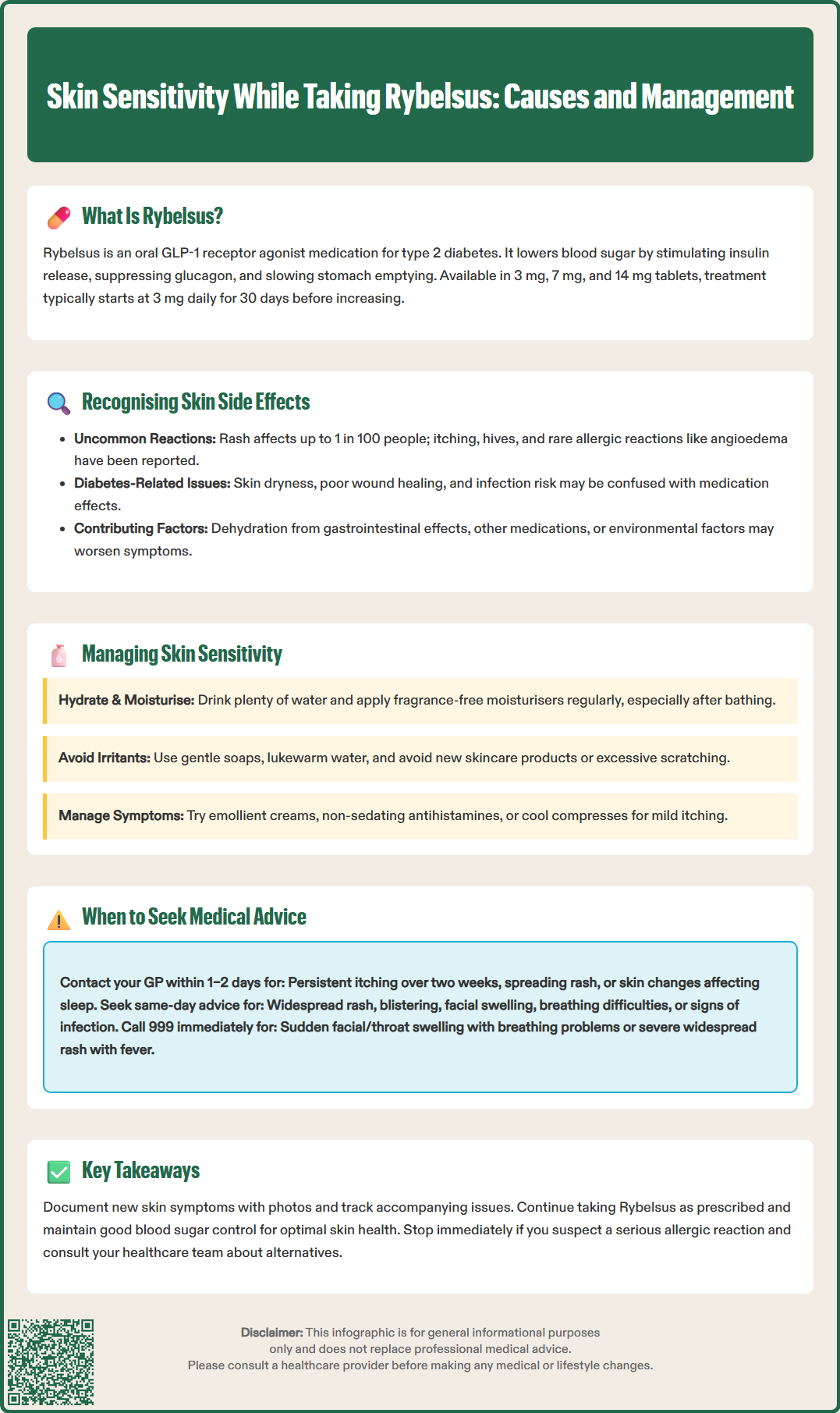
Rybelsus (semaglutide) is an oral GLP-1 receptor agonist licensed in the UK for treating type 2 diabetes mellitus in adults. Whilst gastrointestinal symptoms are the most commonly reported side effects, some patients have raised concerns about skin sensitivity during treatment. Skin reactions are not amongst the most frequently documented adverse effects in clinical trials, but individual responses vary. Understanding how to recognise, manage, and when to seek medical advice for skin-related symptoms is important for anyone taking Rybelsus. This article explores the relationship between Rybelsus and skin sensitivity, offering practical guidance for patients and healthcare professionals.
Quick Answer: Skin sensitivity is an uncommon side effect of Rybelsus, affecting up to 1 in 100 people, with rash, itching, and urticaria being the most reported dermatological reactions.

Mounjaro® is the most innovative GLP-1 medication proven to dramatically curb appetite, hunger, and cravings to help professional men achieve substantial weight loss.
Start Here
Wegovy® is a weekly injectable GLP-1 medication with proven effectiveness in reducing appetite, hunger, and cravings to help busy professionals lose significant weight.
Start HereRybelsus (semaglutide) is an oral medication licensed in the UK for the treatment of type 2 diabetes mellitus in adults. It belongs to a class of medicines called glucagon-like peptide-1 (GLP-1) receptor agonists, which work by mimicking the action of a naturally occurring hormone that helps regulate blood sugar levels.
The mechanism of action involves several complementary effects. Rybelsus stimulates insulin secretion from the pancreas when blood glucose levels are elevated, whilst simultaneously suppressing the release of glucagon, a hormone that raises blood sugar. Additionally, it slows gastric emptying, which helps reduce post-meal glucose spikes, and may promote a feeling of fullness that can support weight management—a beneficial effect for many people with type 2 diabetes, although Rybelsus is not licensed for weight loss in the UK.
Rybelsus is typically prescribed when diet and exercise alone have not achieved adequate glycaemic control, or when other diabetes medications such as metformin are insufficient or unsuitable. It is available in three tablet strengths (3 mg, 7 mg, and 14 mg) with a standard titration schedule: 3 mg daily for 30 days, then 7 mg daily, with the option to increase to 14 mg if needed for glycaemic control.
Rybelsus must be taken correctly for optimal absorption: take it first thing in the morning on an empty stomach with up to 120 mL of water, swallow the tablet whole (do not crush or chew), and wait at least 30 minutes before eating, drinking, or taking other oral medicines.
As with all prescription medicines, Rybelsus can cause side effects in some individuals. Whilst gastrointestinal symptoms such as nausea and diarrhoea are the most commonly reported adverse effects, some patients have raised concerns about skin-related reactions. It's also worth noting that when used in combination with insulin or sulfonylureas, there may be an increased risk of hypoglycaemia.

Skin reactions are not among the most frequently reported side effects of Rybelsus in clinical trials or post-marketing surveillance data. However, individual responses to medications can vary, and some patients may experience skin-related symptoms during treatment.
According to the Summary of Product Characteristics (SmPC), the following skin-related adverse effects have been reported with Rybelsus:
Rash (uncommon - may affect up to 1 in 100 people)
Pruritus (itching without visible rash)
Urticaria (hives)
Hypersensitivity reactions including angioedema (rare)
It is important to note that diabetes itself can affect skin health, potentially causing dermatological complications including dry skin, poor wound healing, and increased susceptibility to infections. These underlying conditions may sometimes be mistakenly attributed to medication effects.
Other factors that might contribute to skin symptoms while taking Rybelsus include:
Concurrent medications or new skincare products
Environmental factors (weather changes, allergens)
Changes in hydration status (GLP-1 receptor agonists can cause dehydration through gastrointestinal effects)
Coincidental skin conditions unrelated to medication
If you notice new or worsening skin symptoms after starting Rybelsus, it is advisable to document the timing, location, and nature of the changes. Take photographs if possible, note any associated symptoms (such as fever, joint pain, or swelling), and consider whether any other new medications, skincare products, or environmental factors might be contributing. This information will be valuable when discussing your symptoms with a healthcare professional.
If you experience skin sensitivity whilst taking Rybelsus, several practical measures can help manage symptoms and maintain skin health during your diabetes treatment.
General skin care strategies include:
Maintain good hydration by drinking adequate water throughout the day, as dehydration can exacerbate skin dryness
Use gentle, fragrance-free emollients regularly, particularly after bathing when skin is still slightly damp (paraffin-based or urea-containing products are often recommended; avoid sodium lauryl sulfate-containing products as leave-on treatments)
Avoid harsh soaps and hot water, which can strip natural oils and worsen sensitivity
Wear loose, breathable clothing made from natural fibres like cotton to minimise irritation
Protect skin from extreme temperatures and direct sunlight, using appropriate sun protection (SPF 30 or higher)
Blood glucose management remains paramount, as optimal glycaemic control supports overall health. Continue taking Rybelsus as prescribed unless advised otherwise by your healthcare team, and monitor your blood sugar levels according to your diabetes care plan.
For mild itching or sensitivity, over-the-counter remedies may provide relief:
Emollient creams or ointments applied liberally
Antihistamines (such as cetirizine or loratadine) may help if itching is troublesome—non-sedating types are generally preferred for daytime use, but consult your pharmacist first as some antihistamines can cause drowsiness
Cool compresses applied to affected areas for short periods
Avoid potential irritants including:
New skincare products, cosmetics, or laundry detergents
Excessive scratching, which can damage skin and increase infection risk
Self-medicating with topical steroids without medical advice
If you experience persistent vomiting or diarrhoea while taking Rybelsus, contact your healthcare provider promptly as dehydration can worsen skin problems and affect your overall health.
If skin symptoms persist beyond two weeks despite these measures, or if they worsen, consult your GP or diabetes specialist. Alternative explanations for your skin symptoms should be explored before attributing them definitively to the medication.
Whilst mild skin sensitivity may not require urgent intervention, certain symptoms warrant prompt medical assessment to rule out serious adverse reactions or alternative diagnoses.
Contact your GP or diabetes care team within 1–2 days if you experience:
Persistent itching or skin sensitivity lasting more than two weeks
Mild rash that is spreading or not improving with basic measures
Skin changes affecting your quality of life or sleep
Uncertainty about whether symptoms are related to Rybelsus or another cause
Seek same-day medical advice (via your GP, NHS 111, or an urgent treatment centre) if you develop:
Widespread rash covering large areas of your body
Blistering, peeling, or raw areas of skin
Facial swelling, particularly around the eyes, lips, or tongue
Difficulty breathing or swallowing accompanying skin symptoms
Signs of infection such as increasing redness, warmth, pus, or fever
Severe itching that is intolerable or preventing normal activities
Yellowing of skin or eyes (jaundice), dark urine, pale stools, or right upper abdominal pain (possible gallbladder issues, which can occur with GLP-1 receptor agonists)
These symptoms could indicate allergic reactions, including anaphylaxis, or other serious conditions requiring immediate treatment.
Call 999 or attend A&E immediately if you experience:
Sudden swelling of the face, mouth, or throat with breathing difficulties
Severe widespread rash with fever and feeling generally unwell
Painful skin with blistering and involvement of the mouth, eyes or genitals
If you suspect a serious allergic reaction to Rybelsus, do not take any further doses until you have discussed this with your healthcare team.
Your healthcare team can assess whether skin symptoms are related to Rybelsus, require investigation, or indicate an alternative diagnosis. They may recommend blood tests, dermatology referral, or medication adjustment. Alternative diabetes treatments can be discussed if Rybelsus is deemed unsuitable for you.
You can report any suspected side effects to the Medicines and Healthcare products Regulatory Agency (MHRA) through the Yellow Card Scheme online or via the Yellow Card app.
Skin reactions such as rash are uncommon with Rybelsus, affecting up to 1 in 100 people according to clinical data. Pruritus, urticaria, and hypersensitivity reactions including angioedema have also been reported but are not amongst the most frequently documented side effects.
Document the timing, location, and nature of the rash, and contact your GP or diabetes care team within 1–2 days if it persists beyond two weeks or affects your quality of life. Seek same-day medical advice if the rash is widespread, blistering, or accompanied by facial swelling or breathing difficulties.
For mild skin sensitivity, continue taking Rybelsus as prescribed unless advised otherwise by your healthcare team, whilst using gentle emollients and maintaining good hydration. However, if you suspect a serious allergic reaction, do not take further doses until you have discussed this with your healthcare provider.
All medical content on this blog is created based on reputable, evidence-based sources and reviewed regularly for accuracy and relevance. While we strive to keep content up to date with the latest research and clinical guidelines, it is intended for general informational purposes only.
DisclaimerThis content is not a substitute for professional medical advice, diagnosis, or treatment. Always consult a qualified healthcare professional with any medical questions or concerns. Use of the information is at your own risk, and we are not responsible for any consequences resulting from its use.